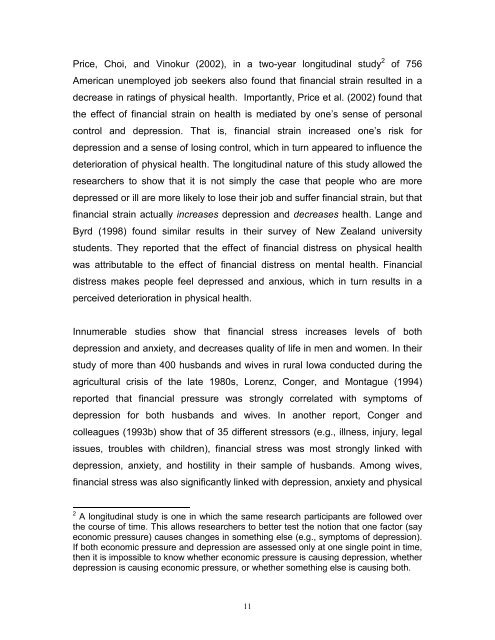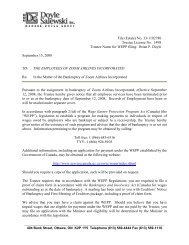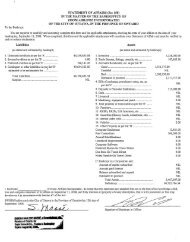Download the Carleton University Report (PDF). - Doyle Salewski Inc
Download the Carleton University Report (PDF). - Doyle Salewski Inc
Download the Carleton University Report (PDF). - Doyle Salewski Inc
You also want an ePaper? Increase the reach of your titles
YUMPU automatically turns print PDFs into web optimized ePapers that Google loves.
Price, Choi, and Vinokur (2002), in a two-year longitudinal study 2 of 756<br />
American unemployed job seekers also found that financial strain resulted in a<br />
decrease in ratings of physical health. Importantly, Price et al. (2002) found that<br />
<strong>the</strong> effect of financial strain on health is mediated by one’s sense of personal<br />
control and depression. That is, financial strain increased one’s risk for<br />
depression and a sense of losing control, which in turn appeared to influence <strong>the</strong><br />
deterioration of physical health. The longitudinal nature of this study allowed <strong>the</strong><br />
researchers to show that it is not simply <strong>the</strong> case that people who are more<br />
depressed or ill are more likely to lose <strong>the</strong>ir job and suffer financial strain, but that<br />
financial strain actually increases depression and decreases health. Lange and<br />
Byrd (1998) found similar results in <strong>the</strong>ir survey of New Zealand university<br />
students. They reported that <strong>the</strong> effect of financial distress on physical health<br />
was attributable to <strong>the</strong> effect of financial distress on mental health. Financial<br />
distress makes people feel depressed and anxious, which in turn results in a<br />
perceived deterioration in physical health.<br />
Innumerable studies show that financial stress increases levels of both<br />
depression and anxiety, and decreases quality of life in men and women. In <strong>the</strong>ir<br />
study of more than 400 husbands and wives in rural Iowa conducted during <strong>the</strong><br />
agricultural crisis of <strong>the</strong> late 1980s, Lorenz, Conger, and Montague (1994)<br />
reported that financial pressure was strongly correlated with symptoms of<br />
depression for both husbands and wives. In ano<strong>the</strong>r report, Conger and<br />
colleagues (1993b) show that of 35 different stressors (e.g., illness, injury, legal<br />
issues, troubles with children), financial stress was most strongly linked with<br />
depression, anxiety, and hostility in <strong>the</strong>ir sample of husbands. Among wives,<br />
financial stress was also significantly linked with depression, anxiety and physical<br />
2 A longitudinal study is one in which <strong>the</strong> same research participants are followed over<br />
<strong>the</strong> course of time. This allows researchers to better test <strong>the</strong> notion that one factor (say<br />
economic pressure) causes changes in something else (e.g., symptoms of depression).<br />
If both economic pressure and depression are assessed only at one single point in time,<br />
<strong>the</strong>n it is impossible to know whe<strong>the</strong>r economic pressure is causing depression, whe<strong>the</strong>r<br />
depression is causing economic pressure, or whe<strong>the</strong>r something else is causing both.<br />
11





